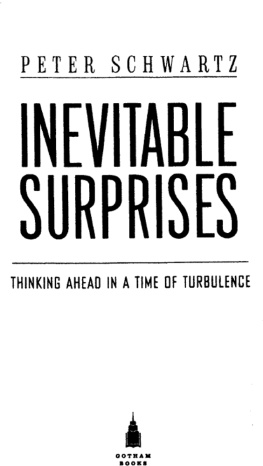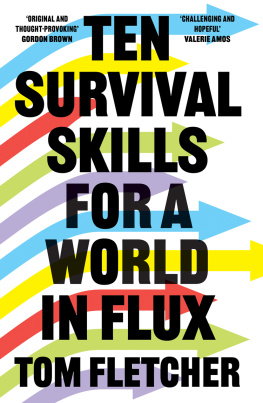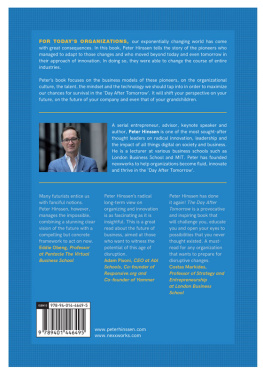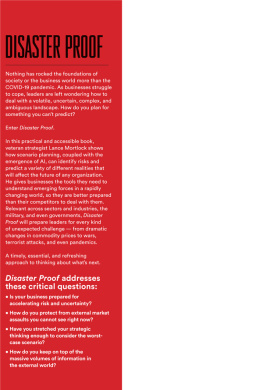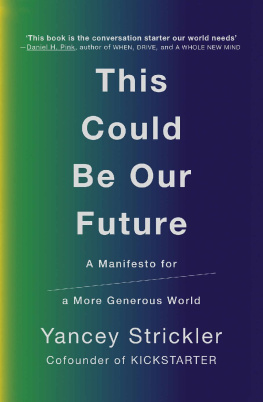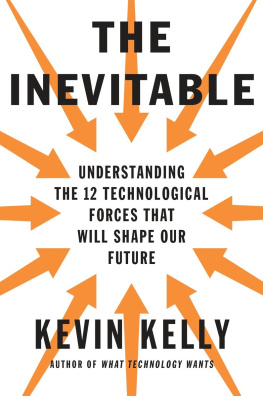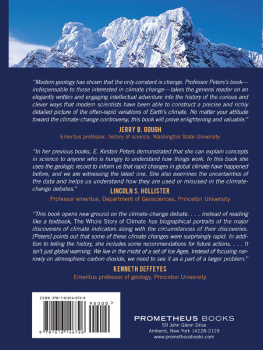INEVITABLE
SURPRISES
ALSO BY PETER SCHWARTZ
The Art of the Long View:
Planning for the Future in an Uncertain World
When Good Companies Do Bad Things:
Responsibility and Risk in an Age of Globalization
(with Blair Gibb)
The Long Boom:
A Vision for the Coming Age of Prosperity
(with Peter Leyden and Joel Hyatt)
Chinas Futures
(with Jay Ogilvy)
PETER SCHWARTZ
INEVITABLE
SURPRISES
THINKING AHEAD IN A TIME OF TURBULENCE

GOTHAM
BOOKS
GOTHAM BOOKS
Published by Penguin Group (USA) Inc.
375 Hudson Street, New York, New York 10014, U.S.A.
Penguin Books Ltd, Registered Offices: 80 Strand, London WC2R 0RL, England
Penguin Books Australia Ltd, 250 Camberwell Road, Camberwell, Victoria 3124, Australia
Penguin Books Canada Ltd, 10 Alcorn Avenue, Toronto, Ontario, Canada M4V 3B2
Penguin Books (NZ) Ltd, Cnr Rosedale and Airborne Roads, Albany, Auckland 1310, New Zealand
Published by Gotham Books, a division of Penguin Group (USA) Inc. Previously published as a Gotham Books hardcover edition.
5 7 9 10 8 6 4
Copyright Peter Schwartz, 2003
All rights reserved
Gotham Books and the skyscraper logo are trademarks of Penguin Group (USA) Inc.
The Library of Congress has cataloged the Gotham Books hardcover edition as follows:
LIBRARY OF CONGRESS CATALOGING-IN-PUBLICATION DATA
Schwartz, Peter, 1946
Inevitable surprises: thinking ahead in a time of turbulence / by Peter Schwartz.
p. cm.
Includes bibliographical references.
ISBN: 978-1-101-21655-2
1-592-40069-8 (paperback)
1. Strategic planning. 2. Business forecasting. 3. Technological innovations. 4. Organizational change. 5. Crisis management. I. Title.
HD30.28.S3479 2003
658.4012dc21 2003049028
Set in Kepler MM with Agency
Designed by Sabrina Bowers
Without limiting the rights under copyright reserved above, no part of this publication may be reproduced, stored in or introduced into a retrieval system, or transmitted, in any form, or by any means (electronic, mechanical, photocopying, recording, or otherwise), without the prior written permission of both the copyright owner and the above publisher of this book.
The scanning, uploading, and distribution of this book via the Internet or via any other means without the permission of the publisher is illegal and punishable by law. Please purchase only authorized electronic editions, and do not participate in or encourage electronic piracy of copyrighted materials. Your support of the authors rights is appreciated.
This book is printed on acid-free paper. 
FOR CATHLEEN,
who never fails to surprise me
PREFACE
O ur world has become no less surprising in the year since the hardcover edition of this book went to press, and our capacity for the denial of those surprises has become even more obvious.
In March of 2002 the United States invaded Iraq with massive force only to be surprised by the swiftness of the Iraqi military collapse. But that was not the last surprise awaiting the American forces. First came looting so pervasive and intense that the ability to rebuild Iraq vanished along with the miles of copper wire and plumbing stripped from buildings. The looters took computers and all the hardware necessary to operate a modern society, along with the historical treasures of an ancient nation. Then came the daily killings of American soldiers and relief workers by the remnants of Saddam Husseins forces in a sustained and low-level guerrilla campaign. As I write this, the 500th American soldier has lost his life. A brilliantly-executed air and ground campaign destroyed the horrific regime of Saddam Hussein but unleashed devastating surprises for which the Americans were apparently unprepared. The war may have been won (though that is not a sure thing as the insurgency continues), but so far there has been little victory in the peace.
In the chapters that follow, the reader will find that we are often surprised by major events that in hindsight were obviously inevitable, and equally important, foreseeable. The dominant intellectual strategy that people bring to bear on the future is denial. This book aims, however, to penetrate the denial by exploring how to anticipate some of what lies ahead, and what some of the most important surprises are likely to be. The final chapter envisions a world of maximum surprise, and how we can respond today to the possibility of such a future.
The past decade has seen remarkable events and changes:
The economic takeoff of China and India, and the depression in Japan
The birth of the network economy and the boom/bust that resulted
911 and the War on Terrorism
The war in the Balkans
The discovery of dark energy
The always-on, always-connected, always-available society
The Columbia disaster and a Chinese taikonaut in orbit
The creation of the Euro
The rise of the antiglobalization movement
The collapse of corporate giants like Enron and Parmalat
The acceleration of productivity
The Y2K non-problem
The movement of nanotechnology from the fringe to the center of science and technology
The death of the music industry as we knew it
And many more
Are these just random events concatenated one after the other, with no meaning or order? Or is there a discernable pattern behind them that just might let us anticipate some of the inevitable surprises ahead? Obviously I believe that these kinds of events are the outcomes of deeper forces at work.
Since the end of the Cold War, two great forces have been expanding the circle of prosperity and common interests. The first force has been the ability of more nations and more people to capture the benefits of knowledge-driven growth made possible by new technology, investment, and education. The second major force has been better governance. By this I mean more competent, less corrupt, more open, and sometimes even more democratic governments. The two best examples of this are, of course, China and India, following in the footsteps of Japan, Korea, Taiwan, and the Western industrialized nations before them. The global and explosive nature of this new growth is of course made possible by the networked information-technology revolution. Knowledge spreads nearly instantaneously around the world and high rates of productivity growth are made increasingly possible.
But there are at least four countervailing forces, and it is at the intersection of these forces that the surprises are likely to occur, for good or ill. First and most difficult is the challenge of radical Islam. Will the radical and violent fringe of Islam, whose vision is carrying their fellow Muslims back to the caliphate of the 13th century, dominate the Islamic world? Or will the Islamic countries join other nations riding the waves of knowledge-driven growth and better governance? Today many of their nations are failed theocracies. And even those that are wealthy because they are resource-rich, such as Saudi Arabia and Indonesia, are riven by the struggle between a retrograde vision of the future and modernization.
The very successes of economic growth are beginning to push up against the limits of the Earths carrying capacity. It is this tension between economic growth and the environment that is the second major force that stands in the way of a more prosperous future. Climate change and the potential for a rapid transformation of the Earth have become even greater concerns recently. I happened to lead two major research projects on the issue in the last year. One conducted for the Pew Center on Climate Change focused on the question of what it would take for the United States to lower the trajectory of growth in greenhouse gases, especially CO2. The study found that even under the most optimistic technological assumptions, including the continued development of new technology such as hydrogen fuel cells and carbon sequestration, unless there is government intervention, such as a limit on carbon emissions with trading permits, we will be much worse off in two decades. The second study was conducted for the Office of the Secretary of Defense and focused on the possible impacts of a period of abrupt climate change: rapid warming leading to even more rapid cooling, especially in the northern latitudes. The conclusions of this study suggested that not only were there early signals that such a change was coming, but that the consequences could be enormous. The result could be a much colder, drier, windier world struggling over water, food, and energy.

